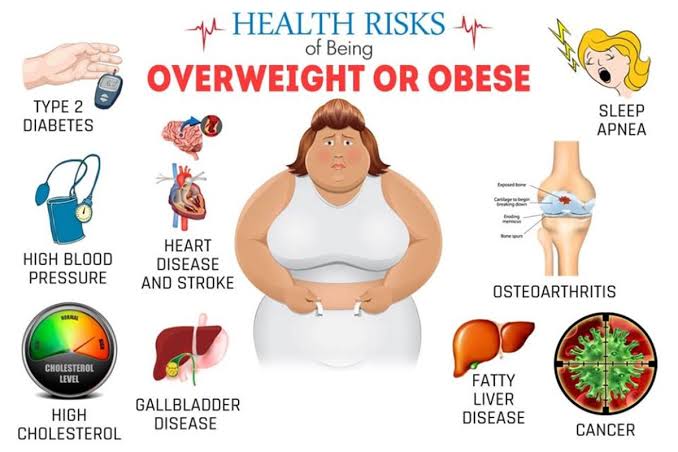
What are the risks of obesity?
Some may view obesity as an aesthetic problem, but it is more than an aesthetic problem. It is a group of chronic diseases. Obese people are susceptible to serious health problems, especially in the Kingdom of Saudi Arabia, where the weight gain rate is 36.9%, as obese people cost the Kingdom more than 500 million riyals annually due to their visits to hospitals. To treat diseases directly caused by weight gain.
Obesity is one of the most serious health problems in the world, as studies have shown that there is a close relationship between obesity and the resulting death rate. A nursing study has proven that the incidence of chronic diseases increases with an increase in the body mass index, and the most common of these diseases is type 2 diabetes, which is linked to It is strongly linked to obesity, as more than 80% of these cases are attributed to the person being obese, as diabetes associated with obesity is one of the most common causes of death, and obesity has a strong relationship with an increase in the incidence of heart and arterial diseases, as the risk increases when obesity is concentrated in the chest and abdomen regions, as studies indicate. An obese person is six times more likely to develop cardiovascular disease than a person of normal weight.
Obesity greatly affects high blood pressure, especially abdominal obesity, as the rate of secretion of the hormone insulin in the blood increases. This increase helps in storing sodium in the body, which leads to high blood pressure and the possibility of strokes. Studies have shown that obesity also has a fundamental role in the possibility of developing diseases. Cancer after smoking. High body mass index in women and men has a strong relationship with increased death rates resulting from cancerous diseases, most notably esophageal cancer, colorectal cancer, liver, gallbladder and pancreas cancer. Men are also at risk of death from stomach and prostate cancer, while women are more at risk. For death due to cancer of the breast, uterus, cervix and ovary.
One of the most prominent diseases associated with obesity is sleep apnea syndrome resulting from pathological snoring, which leads to increased daytime sleepiness and insomnia at night. One of the greatest sufferings among people with obesity is the effect of excess weight on bone health, especially the knee joints and feet. Among these diseases we mention osteoporosis, which It leads to several fractures, and obesity has a negative impact on psychological states. Obese people may be vulnerable to low self-esteem, which is a known cause of depression. One of the most prominent behavioral mistakes in our Arab society is treating individuals according to their appearance.
Many people wonder: Is there a relationship between obesity and delayed childbirth? A study has shown that obesity has a close relationship with infertility in both sexes. In women, the problem of abdominal fat causes an increase in the secretion of the male hormone (testosterone), which causes the cessation of ovulation and temporary infertility, but when you follow a diet to reduce weight, the hormone levels return to normal and the infertility problem disappears. As for men, the percentage of female hormones (estrogen) is higher than the normal rate, which may affect the shape and function of sperm.
In conclusion, we point out that the most important benefits of losing weight are feeling satisfied with your body shape and reducing your exposure to diseases associated with obesity, which allows you to enjoy your daily life in all physical and psychological aspects. The most important factor in losing weight is self-will to maintain the ideal weight after achieving it, so you may You need long and continuous follow-ups with a nutritionist to learn about weight loss programs






